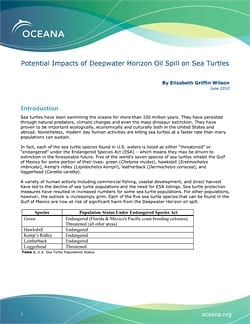Report | March, 2016
Potential Impacts of Deepwater Horizon Oil Spill on Sea Turtles
The oil spill could cause many new threats to already endangered sea turtles
A variety of human actions including commercial fishing, coastal development, and direct harvest have led to the decline of sea turtles populations. In fact, all of the sea turtles found in U.S. waters are listed as either “endangered” or “threatened” under the Endangered Species Act – which means they may be driven to extinction in the foreseeable future. Individuals of five of these species inhabit the Gulf of Mexico for some portion of their life cycle. Sea turtle populations were already struggling and now the Deepwater Horizon oil spill in the Gulf of Mexico poses a slew of new threats to these animals.
The oil spill could cause significant harm to sea turtles in a variety of different ways. First, there could be reduced nesting due to injuries to mature females or nesting beaches being covered in oil. Second, if oil washes up on the beach after the nests are already laid, hatching success rates will likely be impacted. Then when the hatchlings make their way to the sea, they will face direct oil exposure, contaminated prey and oil impacts on their habitat, all greatly decreasing their already slim chances of survival.
In addition to the threats to reproductive success, sea turtles can suffer both internal and external injuries from contact with oil or chemical dispersants that are being used to disperse the oil. Injuries from external exposure include skin irritation, chemical burns, and infections. Inhaling or ingesting the oil can cause significant internal damage ranging from damage the respiratory tract to a blocked digestive system.
For turtle populations that are already in danger of extinction, an oil spill such as the Deepwater Horizon could be the final blow. Many areas where drilling is occurring or is being considered are critical sea turtle habitats. Continuing to drill for oil and gas in these areas will lead to more spills and could result in extinction for these unique marine animals.




